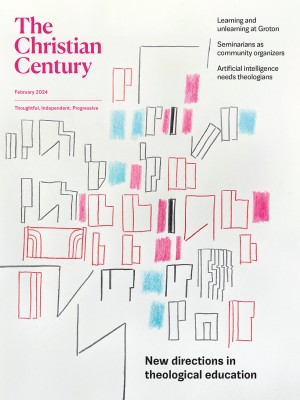February 14, Ash Wednesday (Matthew 6:1–6, 16–21)
How did my friend feel making a cross on my forehead, not knowing how long I’d be alive?
After 16 years of ordained ministry, my Ash Wednesday experiences were vast and varied: imposing ashes on newborns in their mothers’ arms at the rail next to nonagenarians, the difference in their skins’ elasticity poignant. I imposed ashes on a young man in the hospital right before he was moved to palliative care. I always preached on Ash Wednesday, when I was an associate as well as when I was the rector, because the rector directed me to when I was on staff and because our elderly deacon couldn’t make it to the early service when I was a rector, so I have stacks of old sermons on these readings.
But last year I didn’t preach or preside or impose ashes on anyone. I was one month out from lung surgery, my third: this one was a pneumonectomy completion, meaning my entire left lung was removed after two previous surgeries that took out just part of it. This time, the surgeon discovered that the cancer had spread to my aorta, and he wasn’t able to remove it all, so I was facing dozens of radiation sessions before I could move on to targeted therapy and return to work, if I did return to work.
Read our latest issue or browse back issues.
So last Ash Wednesday, I sat next to my sister who was visiting me from Arizona. She had wanted to come help as soon as possible after my surgery, but I asked her to wait until Ash Wednesday, so that we could be together at church. I couldn’t remember an Ash Wednesday that she and I had spent together. We sat in the nave of the parish I served as rector, waiting to kneel at the altar rail and have ashes imposed on us by my dear friend Andie, who was not only filling in for me at St. David’s but had brought meals to my husband and me soon after the surgery. Attendance was sparse, but a few kids in the front peeked back at me, nudging their parents to let them know I was there. We had come in a little late so I wouldn’t need to speak to anyone.
I have long loved Ash Wednesday, the one day of the year when we all had to contemplate our deaths. But now I heard Jesus’ admonition about hypocrites differently. Why we do what we do matters, I had long told my congregations. Why did you come here to get ashes on your forehead? Are you trying to be seen by others so they’ll think you’re pious, or are you truly trying to remember that you are dust and to dust you shall return?
Now I wondered if I had ever truly remembered my death. Instead, I had thought about everyone else’s.
Ash Wednesday was extra hard the years after my parents died or after that young man on palliative care died or as the number of nonagenarians dwindled. Ash Wednesday was hard the year we were shut down because of the pandemic and I had to tell people to smear the ashes on themselves. But now I wondered if this was my last Ash Wednesday, if I would ever impose ashes on anyone else. Had I loved Ash Wednesday because I liked the idea of myself as a little morbid, a little maudlin, and wanted others to see me that way? Now I had only one lung, broken ribs, a tumor on my aorta and was almost “recovered” enough to start radiation. I knew that I was returning to dust like I never had before. Had I been a hypocrite all those previous years? And why was I here with these people now, my own congregation? Did I want them to see me in my weakness?
This church was my earthly treasure, with its stained carpet and squirming kids, with Andie up front. She wasn’t wearing the church’s purple chasuble that matched the altar cloth but rather her own simple stole. I wondered if she declined to wear the chasuble because it was something shiny that a moth could consume. I wondered how she felt making a black cross on my forehead, not knowing if I would still be alive next Ash Wednesday.
I felt awkward making my way up to the front. I wasn’t walking as well as I used to, becoming breathless after just a few steps. I assumed people were watching me. But once I knelt between my sister and a parishioner, I no longer felt eyes upon me. I experienced a kinship in a way I did not when I stood above people, smudging their foreheads with my forefinger or thumb. I was one of many made from dust, on my way back.





